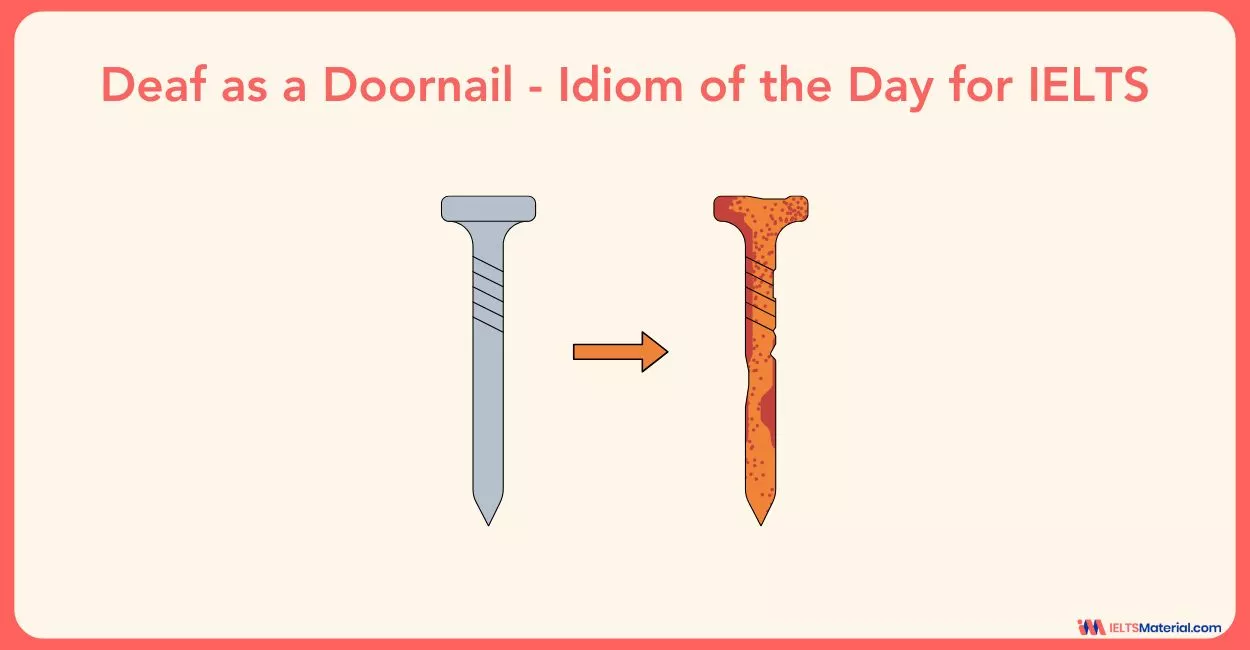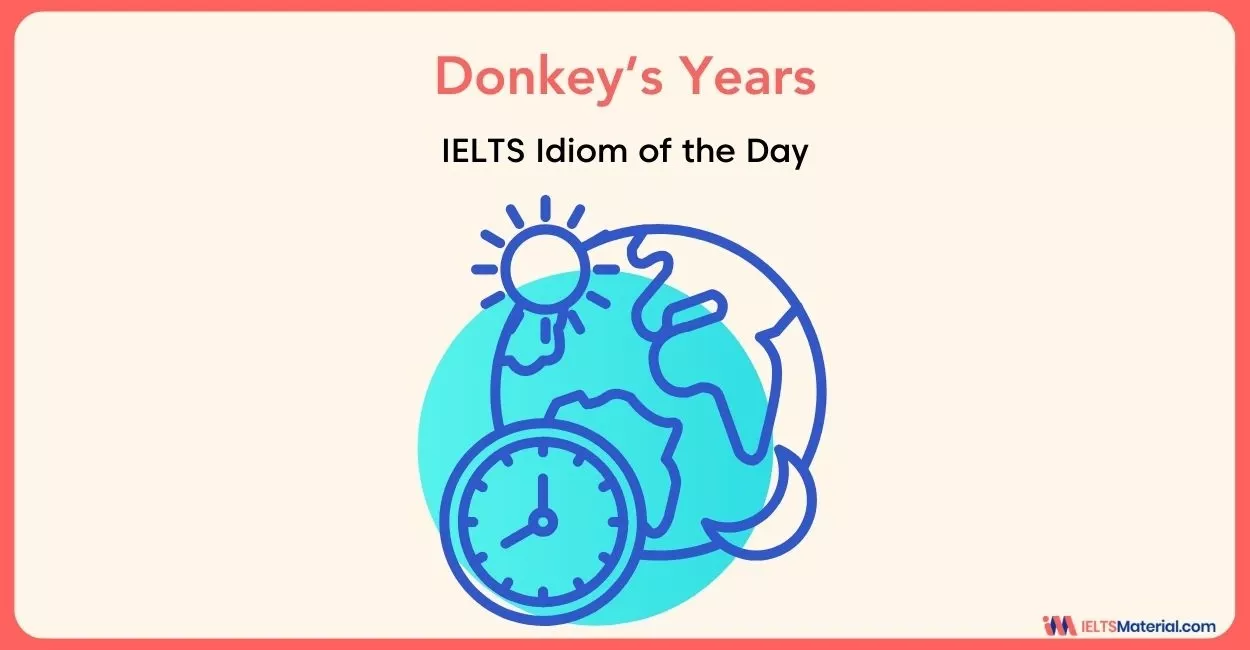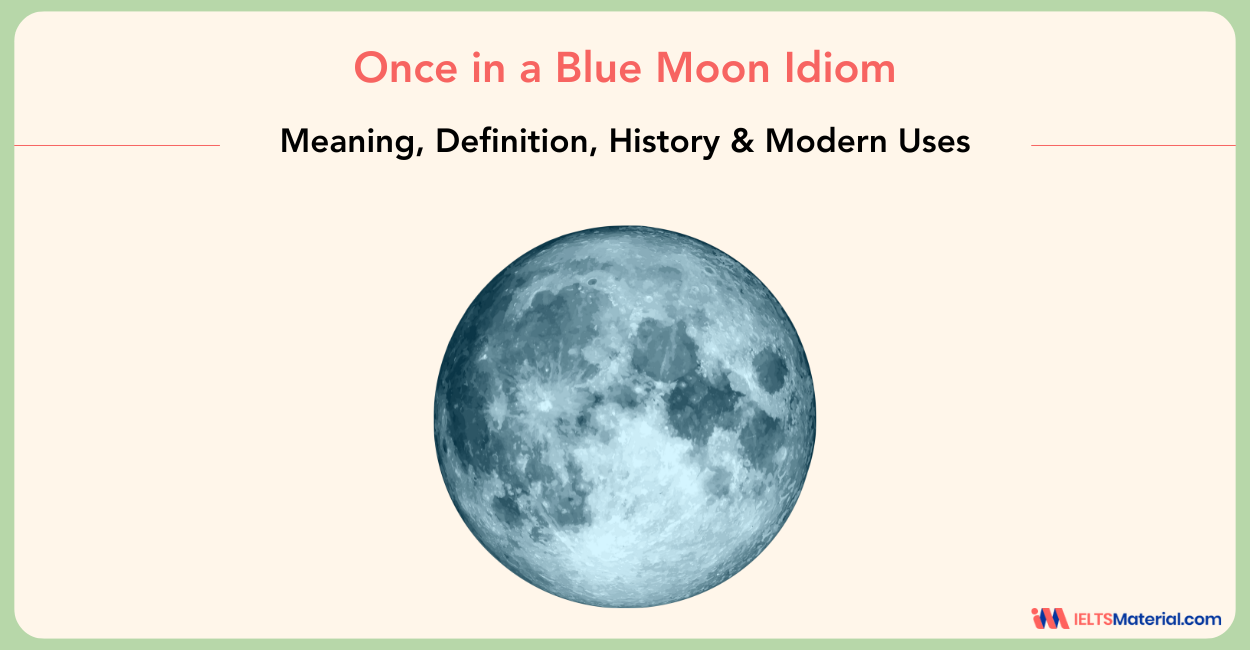Donkey’s Years Idiom: Meaning, Origin, Usage & Exercises
5 min read
Updated On
-
Copy link
The idiom ‘donkey’s years’ is an informal British English expression meaning ‘a very long time’. In this blog, explore the examples, history, and similar expressions related to the idiom, with exercises to improve your IELTS vocabulary and band score.
Table of Contents

Limited-Time Offer : Access a FREE 10-Day IELTS Study Plan!
The idiom ‘donkey’s years’, mainly used in British English, represents the fact that time and memory are at the heart of many idiomatic expressions in English. It conveys the sense of something lasting an extremely long time. Whether you are reminiscing about childhood or describing how long it has been since you met an old friend, this idiom injects humor, relatability, and vivid imagery.
In this blog, we will explore the meaning, origin, and usage of the idiom ‘donkey’s years’, one of the useful idioms for IELTS Speaking to score band 8.0+, and provide examples from the IELTS exam.
Donkey’s Years Idiom: Meaning
The idiom ‘donkey’s years’ means a very long time. It suggests that something has lasted so long that it feels almost endless. People often use the phrase informally in conversations, usually with a humorous or lighthearted tone.
Origin of Donkey’s Years Idiom
The phrase ‘donkey’s years’ apparently originated in the early 20th century, referring to the long ears of a donkey. It first appeared in a 1916 novel, With Jellicoe in the North Sea, by Frank Hubert Shaw: “This isn’t a battleship war at all; it’s a destroyer-submarine-light cruiser show. They’ll never come out in donkey’s years, not they. They know jolly well we shall scupper ’em if they so much as dare to show their noses outside the wet triangle.”
Alternatively, the idiom plays on a pun:
- ‘Donkey’s ears’ (long ears) became humorously mispronounced or misheard as ‘donkey’s years’.
- Donkeys also live long lives, reinforcing the metaphor of something lasting for ages.
By the 1920s, the idiom had firmly entered everyday British slang, and it remains widely used in informal contexts today.
Donkey’s Years Idiom Usage
Given below are some example sentences that show how ‘donkey’s years’ idiom can be used appropriately in different contexts.
- I’m looking forward to seeing my cousins; I haven’t seen them in donkey’s years.
- I have wanted to buy this book for donkey’s years.
- I’m so excited for tonight’s opera. I have wanted to see The Magic Flute for donkey’s years.
- I lived in Manchester once, but I haven’t been back there in donkey’s years.
- I haven’t been to a live concert in donkey’s years. I can’t take it anymore!
- This is the first time I’m going on a date in donkey’s years. I hope I don’t mess it up!
- It has been donkey’s years since I have been on a boat. Let’s see if I can still sail.
- I haven’t gone hiking in donkey’s years, not since the baby came. And I miss it.
- I can’t believe it’s been donkey’s years since I had a good cheeseburger!
- He hasn’t studied French in donkey’s years, so he forgot most of it.
Are you looking for expert guidance on vocabulary building for IELTS?
Book an IELTS online class & talk to our experts NOW!
Donkey’s Years Idiom: Synonyms and Related Phrases
In the table below, you will find some of the best phrases to use in IELTS Speaking related to the idiom ‘donkey’s years’.
|
Idiom/Expression |
Meaning |
Example Sentence |
|---|---|---|
|
Ages |
a very long time |
It’s been ages since I saw you. |
|
Forever and a day |
exaggerated phrase for eternity |
The train took forever and a day to arrive. |
|
Time immemorial |
so long ago that memory cannot trace |
People have told stories since time immemorial. |
|
Yonks (slang) |
a very long time (informal British) |
I haven’t eaten fish and chips in yonks. |
|
An eternity |
a seemingly endless period |
Waiting for exam results feels like an eternity. |
Boost your IELTS vocabulary and achieve success with our free online webinars.
Donkey’s Years Idiom: Detailed Usage in IELTS Contexts
Let us explore how the idiom ‘donkey’s years’ can be applied effectively across various IELTS Speaking contexts, with sample answers.
IELTS Speaking Part 1
- Question: Do you often meet your childhood friends?
- Sample Answer: Not really, I haven’t seen them in donkey’s years because most of them have moved to different cities and the others are busy with their lives.
IELTS Speaking Part 2
- Cue Card: Describe an old friend you recently reconnected with.
- Answer Excerpt: “I recently met my school friend at a wedding after not seeing him in donkey’s years. We had so much to talk about, and it felt like no time had passed even though it had been almost a decade.”
Explore our Vocabulary for IELTS to boost your IELTS vocabulary!
Donkey’s Years Idiom: Practice Exercises
You will find some exercises that will help you improve your understanding and application of the idiom ‘donkey’s year’.
Exercise A: Rewrite the sentences using the idiom donkey’s years.
1 I haven’t seen my school friend in a very long time.
2 This railway bridge has been here for ages.
3 We’ve been waiting for hours at the bus stop.
4 She has been working in the same company for decades.
Exercise B: Identify the incorrect use of donkey’s years in these sentences and correct them.
1 I’ve been craving pizza for donkey’s years.
2 They’ve known each other for donkey’s years.
3 The old typewriter has been lying in the office for donkey’s years.
4 He said he ran for donkey’s years to catch the train.
Donkey’s Years Idiom: Answer Key for Practice Exercises
|
Exercise A |
Exercise B |
|---|---|
|
1. I haven’t seen my school friend in donkey’s years. 2. This railway bridge has been standing for donkey’s years. 3. We’ve been waiting for donkey’s years at the bus stop. 4. She has been working in the same company for donkey’s years. |
1. Incorrect: craving is about desire, not long duration. Correct: I haven’t eaten pizza in donkey’s years. 2. Correct 3. Correct 4. Incorrect: running is about speed, not time span. Correct: He has been using that train route for donkey’s years. |
In conclusion, the idiom ‘donkey’s years’ adds humor, warmth, and vividness to conversations about time. For IELTS learners, using this idiom shows cultural awareness and advanced language skills. Learning idioms like these can boost your IELTS vocabulary significantly and bring life to ordinary statements about time. In short, if you want to sound more natural and expressive in English, do not wait donkey’s years to start using this idiom!
Useful Links:
- Fair-weather Friend Idiom: Meaning, Origin, Usage & Exercises
- Time after Time - Idiom of the Day for IELTS
- To Have a Whale of a Time – Idiom Meaning, Origin, Examples & IELTS Usage
- Donkey Work – Idiom of the Day for IELTS Speaking
- Useful Resources & Websites for IELTS Vocabulary
- What is the Correct Tone in IELTS Speaking Test?
Explore IELTS Resources

Start Preparing for IELTS: Get Your 10-Day Study Plan Today!
Check out other Idioms

Haniya Yashfeen

Haniya Yashfeen
Recent Articles

Kasturika Samanta

Prity Mallick

Nehasri Ravishenbagam







Post your Comments